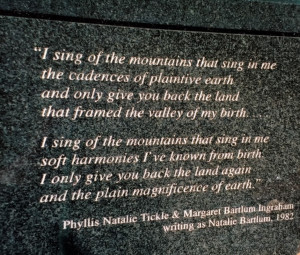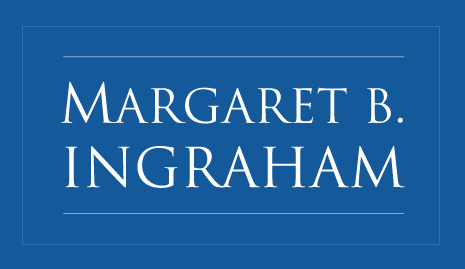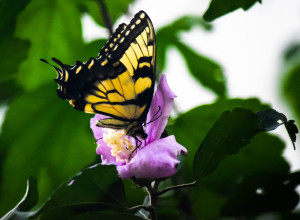Two poets writing in a third voice best describes the collaboration of Phyllis Natalie Tickle and Margaret Bartlum Ingraham. Our joint work is published under the name Natalie Bartlum. The national debut of a Natalie Bartlum poem in print occurred in the Winter of 1981 in Volume I, Number 1 of Cumberland Poetry Review, a publication founded by Donald Davie. Because of his stature in the literary and scholarly worlds, Davie was able to solicit and publish new work from some of the finest American and international poets and critics of the day. Such well-known, or soon -to-be, poets as Richard Eberhart, William Stafford, Donald Hall, Diane Wakowski, Louis Simpson, Mark Jarman, Sherod Santos and John Hollander had poems appearing beside Natalie Bartlum’s “Aubade” (which I will place last among these early poems) in that inaugural issue. Only two other women were among the 29 contributors in that volume of the journal.
It was because of Davie’s respect for Phyllis Tickle that such an unusual submission as a “collaborative piece” under a pen name was even allowed to be considered by the editorial board. The journal’s stated policy referred explicitly to “the writer” and “the poet” as an individual contributor. In this perspective, Cumberland Poetry Review was representative of a trade that, at the time, hindered our ability to be published widely in literary journals; in its willingness to grant an exception, CPR was itself exceptional. For that, Phyllis and I remained grateful and found much encouragement.
Although “Aubade” was first to be published, it was not the first poem that Phyllis Tickle and I completed in the voice of Natalie Bartlum. “Ordinary Song” was.
ORDINARY SONG
I sing of the mountains that sing in me
the cadences of plaintive earth
and only give you back the land
that framed the valley of my birth.
I fed each day on mountain thyme
and nightly cradled with the quail.
I woke to walls of laurel leaf
and raised a morning song to hail
the line of sheep who grazed
across the valley rim.
I learned by heart the ancient sounds
of bird and pine, of stream and fawn,
waiting to hear spring waters clear
below the stones they played upon,
the litany of earth.
I sing of the mountains that sing in me
soft harmonies I’ve known from birth.
I only give you back the land again
and the plain magnificence of earth.
 The life of this “Ordinary Song,”our first Natalie Bartlum poem, turned out to be anything but ordinary. A portion of one stanza is inscribed on the black granite wall of the Pathway of History in Bicentennial Capitol Mall State Park in Nashville, TN. There it will publicly commemorate the east Tennessee mountains we both loved– and, as long as it stands, it will also sing of the writing partnership of two friends simply who wondered what might happen if they allowed their individual voices to speak together as one. This poem also was literally transformed into harmony and song when Phyllis and I worked with composer Enrica Ramey, who had studied at Juilliard, to create “Mountain Psalm” that was debuted at the Harvest Music concert in Memphis in November of 2002.
The life of this “Ordinary Song,”our first Natalie Bartlum poem, turned out to be anything but ordinary. A portion of one stanza is inscribed on the black granite wall of the Pathway of History in Bicentennial Capitol Mall State Park in Nashville, TN. There it will publicly commemorate the east Tennessee mountains we both loved– and, as long as it stands, it will also sing of the writing partnership of two friends simply who wondered what might happen if they allowed their individual voices to speak together as one. This poem also was literally transformed into harmony and song when Phyllis and I worked with composer Enrica Ramey, who had studied at Juilliard, to create “Mountain Psalm” that was debuted at the Harvest Music concert in Memphis in November of 2002.
The five poems that follow were initially published between 1980 and 1985 and represent only one phase of the poetic life of Natalie Bartlum.
CHRISTOPHER’S POND
1
You could say
only the breezes
make the edges certain
rippling a skin of lily pads
like the scales of a lizard
stretching to sun.
The green roll of surface
swaying white blossoms
is the only sign
that hidden water
is drawing you
to witness a place
your legs become divining rods
treading the shoreline
in dark faith.
2
You go forward
sink slowly away
pulled silently
toward the deep center
before you surface
rising through flowers.
On the other side
we find you
resting on the cool ground
in a place of certain borders
your skin glistening
in new light.
RINGNECKS RETURN
You did not see the flock
masked by evening
drop from the sky
to the pond beyond the trees
but in the morning
found the geese
feeding in the stubbled fields
and counted them:
the same five birds miraculous
to land again
in so precise a resting place
bringing color to the solstice.
Two days, three nights this time
before the current changed,
signaled flight,
the tight formation
you plotted in your eye
to number them,
mounting to take the clouds
past all accounting
until they come again.
HOPE, ARKANSAS
Near that town
barely two miles east
where the land
turns itself to Texas
before the line,
she gave herself to the ditch,
to the concave promise
of the half grave.
A small doe,
beige as the dust,
she left the cooling of her flesh
to the cooling earth
of the still, March dusk.
Impatient in leaving
her eyes open,
she forgot her stare
would summon the crow
to land and test the age of death,
to begin the ancient feast
that finally completes
the halfness of a ditch.
THUNDERBOLT ISLAND
After the storm
straining the solstice,
it could have been
any two days’ light
hanging behind the Spanish moss
where skydark water
circles the marsh grasses
like a tide the moon refuses
to take back.
The creek is a lost undertow
only the arched fish knows
to pull toward its mouth.
Black as live oak’s shadow,
the tongues of water
are still surface legends.
As midnight edges from the marsh
an egret, lifting lightning, shrieks
to beckon flight wings will not follow
as if the call were enough;
earth slips her moorings
back into the night.
AUBADE
Every morning early
before the wrens,
the elderly rise and go
places no one knows of.
Cheekbones red with rouge,
sensing if they walked
too plainly into life,
out and in,
their boldness would offend.
And so they go,
frail fingers, fragile skin
warmed in the secret wind
they follow,
rising on a breath
thin enough to flit and bend
and turn, victorious
in the end,
to light
beyond the places
of the wren.

